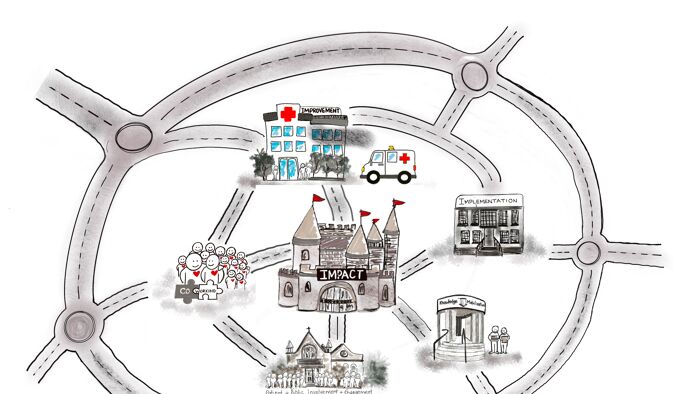Knowledge to Care
The Knowledge to Care (K2C) cluster develops the theory and practice of evidence-informed healthcare. We strategically use five ways of working that underpin contemporary healthcare to inform our activity. The K2C cluster views patient and public involvement and engagement, co-working, implementation science, improvement science and knowledge mobilisation as a repertoire of approaches which, when used appropriately and skilfully, can maximise practice impact.
Our approach
-
Patient and public involvement and engagement: working with members of the public
-
Co-working: working with stakeholders to make changes or create something new
-
Implementation: adoption of new evidence into routine practice
-
Improvement: enhancing the adoption of evidence in practice
-
Knowledge mobilisation: sharing usable knowledge across communities to catalyse change
Our Projects
The mission of Knowledge2Care is to operationalise evidence-informed care. Our expertise allows us to use a repertoire of techniques to support healthcare practitioners to optimise care. Explore research projects in the Knowledge2Care cluster here.

Useful Knowledge2Care Resources
A collection of recommended reading for those interested in K2C approaches.
-
Coproducing and Codesign
Co-producing and Co-designing: THIS Institute has produced this essential guide to co-working approaches in healthcare, with key definitions and practical examples of application. Recommended if you are interested in working with the end-users of your research to increase it’s relevance.
-
Collaboration-based approaches
Collaboration based approaches: This element, produced by THIS Institute explores the impact of quality improvement collaboratives and communities of practice. It offers guidance, with practical examples, in when to use and how to implement these approaches. Highly recommended if your project idea could benefit from working with networks of healthcare staff to identify and make improvements.
-
Designing interventions for behaviour change
How is the Theoretical Domains Framework applied in designing interventions to support healthcare practitioner behaviour change? A systematic review: In this paper, Prof Judith Dyson and Prof Fiona Cowdell systematically review how the TDF has been applied to assess barriers and facilitators, select behaviour change techniques, and design interventions. It offers insights into how these frameworks can be refined for broader and more effective use.
-
Health behaviour interventions
How is the theoretical domains framework applied to developing health behaviour interventions? A systematic search and narrative synthesis: This systematic review, authored by Prof Judith Dyson and Prof Fiona Cowdell, explores how to behaviour theory frameworks (like the TDF, COM-B, and BCW) have been applied to develop health behaviour change interventions. It is particularly useful for researchers or practitioners aiming to design structured, theory-informed interventions and for those seeking insights into the challenges, practical steps, and gaps in the application of these frameworks.
-
Engaging older people in healthcare intervention design
How and how well have older people been engaged in healthcare intervention design, development or delivery using co‐methodologies: A scoping review with narrative summary: Co-methodologies are valued in healthcare but rarely used with older people. Engagement at every stage of a project may be unrealistic if studies are prolonged and the level of commitment beyond what any older person can offer. Prof Judith Dyson and Prof Fiona Cowdell offer insights to the use of co-methods with older people, including the importance of reporting co-methods work, and for.
-
Bridging patient-practitioner research boundaries
Knowledge mobilization in bridging patient‐practitioner‐researcher boundaries: A systematic integrative review: Knowledge is mobilised to improve care, promote health, or prevent ill health. This integrative review, authored by Prof Fiona Cowdell provides new insights into when and how knowledge mobilisation has crossed patient-researcher-practitioner boundaries and the impact this has achieved.